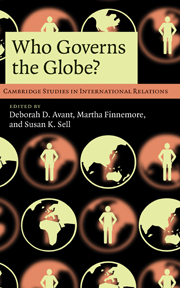Preface
Published online by Cambridge University Press: 05 June 2012
Summary
This project was born of shared frustration. All three of us were engaged in different research about global governance but we all were dissatisfied. Something fundamental was missing in the way academics talked about what we were seeing on the ground. Traditional theoretical apparatus could not accommodate the diversity and creativity of activity we encountered. Standard academic language could not even describe it. Academic talk about global governance was about regimes, constraints, bargaining, and principal–agent relationships. It erected sharp divides between economic and security issues. Most of it was about states or intergovernmental structures. The majority described stasis or equilibrium. Creativity and innovation were not integral to global governance talk. Neither were the complex webs of varied actors pushing change. Yet the global governance we saw in our own research across very different issue areas was remarkable for its dynamics, creativity, and variety of actors.
In 2004 we came together to found a new Institute for Global and International Studies (IGIS) at the George Washington University's Elliott School of International Affairs. At IGIS, suddenly we had adjacent offices and geography bred inspiration. In a series of conversations we began to articulate what we thought was missing in both our theory and language of global governance. We also discussed the work of other scholars who were wrestling with related issues. We contacted a number of these scholars and persuaded them to participate in an organic process of discussions and research presentations that would evolve into the current volume.
- Type
- Chapter
- Information
- Who Governs the Globe? , pp. xiii - xivPublisher: Cambridge University PressPrint publication year: 2010



